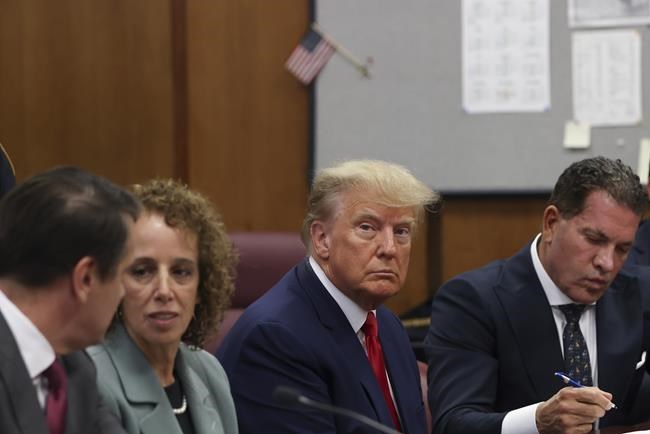WASHINGTON — Court documents in the case against Donald Trump, unveiled Tuesday after the former president's historic court appearance, have so far provided little clear insight into the prosecution's underlying legal strategy.
A single phrase in the statement of facts — "for tax purposes" — may offer an important clue.
Trump and his operatives designed a hush-money scheme to protect his 2016 campaign against claims of extramarital sexual encounters, the documents allege — a plan that was carried out by former lawyer and fixer Michael Cohen.
Trump now faces 34 counts of falsifying business records "to conceal criminal conduct that hid damaging information from the voting public during the 2016 presidential election," reads the statement of facts.
It's that "criminal conduct" that elevates what would otherwise be misdemeanor charges to the level of a felony. But neither the documents nor Manhattan district attorney Alvin Bragg have specified what that conduct is.
Most have presumed a breach of election law, since Cohen — convicted in 2018 of tax evasion and illegal campaign contributions and now an important state's witness — admitted "influencing the election" was the principal goal.
But tax fraud may also be part of the picture, say experts who point to a largely overlooked line on the first page of Bragg's statement of facts.
"The participants also took steps that mischaracterized, for tax purposes, the true nature of the payments made in furtherance of the scheme," it reads.
Cohen, described throughout the document as "Lawyer A," set up a shell company in order to make a covert $130,000 payment to adult film star Stormy Daniels in exchange for her silence prior to the 2016 election.
Through a series of monthly checks over the course of 2017, Cohen was compensated with twice what he was owed to cover the tax bill, "so that (Cohen) could characterize the payment as income on his tax returns, instead of a reimbursement."
Neama Rahmani, a former assistant U.S. attorney who now operates a personal injury practice in California, called it a "belt-and-suspenders" approach. If violating campaign finance laws isn't enough for a jury, the tax angle might be.
"If you can say that is a violation of New York state tax law, I think that's cleaner," Rahmani said. "There's less vulnerability to attack on legal or factual grounds, so I prefer it to the illegal campaign contribution angle."
Another telling detail from the statement of facts was a footnote on the penultimate page, warning that the document "does not contain all facts relevant to the charged conduct."
The fact that the case remains opaque is entirely intentional, Rahmani said.
"He doesn't want to tip his hand because he's likely facing a motion to dismiss the indictment as insufficient as a matter of law," he said.
"You know that motion to dismiss is coming. So if you're Bragg, you don't want to over-commit to a particular position that may leave you vulnerable to that motion."
Nor is Bragg legally required to show all his cards at this stage, former Manhattan assistant district attorney Daniel Horowitz said Wednesday in an interview with MSNBC.
"Under the law, a prosecutor with a case like this doesn't have to specify or commit to a particular theory right up until the point that the jury is selected," Horowitz said.
Bragg's theory appears to be that business records were falsified to cover up or further the commission of "two potential crimes: one, violating New York state's election laws in the run-up to the 2016 presidential campaign ... and potentially to violate New York state's tax laws."
Trump pleaded not guilty in Manhattan court Tuesday before retreating to his gilded country-club compound in Palm Beach, where he openly defied the court's warning against publicly bad-mouthing or threatening prosecutors.
If he ends up facing a gag order, it will be up to the judge to ensure it's enforced, which doesn't always happen, Rahmani said.
"If there is a gag order, it's up to the judge to enforce the gag order," he said. Such an order was imposed on Alex Jones in his recent defamation case, but the vitriolic conspiracy theorist brazenly ignored ignored it.
"The guy was holding a press conference, violating the gag order left and right, and the judge didn't enforce the gag order. So it was all bark, no bite."
This report by The Canadian Press was first published April 5, 2023.
James McCarten, The Canadian Press



